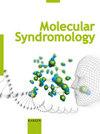一种罕见的可治疗心肌病病因:原发性肉碱缺乏症
IF 0.9
4区 医学
Q4 GENETICS & HEREDITY
引用次数: 0
摘要
简介:原发性肉碱缺乏症(PCD)是一种罕见的常染色体隐性遗传疾病,由溶质运载家族 22 成员 5(SLC22A5)基因的功能缺失突变引起,该基因编码一种高亲和性钠离子依赖性有机阳离子转运蛋白(OCTN2)。肉碱缺乏可导致急性代谢失调,或在更隐蔽的情况下导致心肌病。与 PCD 相关的心肌病通常表现为危及生命的心力衰竭。这种表现通常还包括骨骼肌肌病。及早发现这种疾病并使用左旋肉碱进行治疗,可以避免与心肌病相关的危及生命的并发症。病例介绍:在此,我们介绍了一名 10 个月大的男性 PCD 患者,该患者是在调查扩张型心肌病的病因时被确诊的,并通过分子遗传分析得到了证实。结论检测到 SLC22A5 基因的同基因 c.254_265 insGGCTCGCCACC (p.I89Gfs) 致病变异。在口服左旋肉碱补充剂后,游离肉碱水平上升至 14 μmol/L,症状消失。LVEF 增加了 45-70%。我们想强调的是,这个问题是代谢失代偿和心脏表型的结合,而这两种表型通常是分开的。本文章由计算机程序翻译,如有差异,请以英文原文为准。
A Rare Treatable Cause of Cardiomyopathy: Primary Carnitine Deficiency
Introduction: Primary carnitine deficiency (PCD) is a rare autosomal recessive disorder caused by loss of function mutations in the solute carrier family 22 member 5 (SLC22A5) gene that encodes a high-affinity sodium-ion-dependent organic cation transporter protein (OCTN2). Carnitine deficiency can result in acute metabolic decompensation or, in a more insidious presentation, cardiomyopathy. Cardiomyopathy associated with PCD often presents with life-threatening heart failure. This presentation also usually includes skeletal muscle myopathy. Early recognition of this disorder and treatment with carnitine can avoid life-threatening complications related to cardiomyopathy. Case Presentation: Herein, we present a 10-month-old male patient with PCD, which was diagnosed while investigating the etiology of dilated cardiomyopathy and confirmed by molecular genetic analysis. Conclusion: Homozygous c.254_265 insGGCTCGCCACC (p.I89Gfs) pathogenic variant of the SLC22A5 gene was detected. With oral L-carnitine supplementation, the free carnitine level increased up to 14 μmol/L and the symptoms disappeared. LVEF increased by 45–70%. We would like to emphasize that this problem is a combination of the metabolic decompensation and the cardiac phenotypes, which are usually separated to either phenotype.
求助全文
通过发布文献求助,成功后即可免费获取论文全文。
去求助
来源期刊

Molecular Syndromology
Biochemistry, Genetics and Molecular Biology-Genetics
CiteScore
1.70
自引率
9.10%
发文量
67
期刊介绍:
''Molecular Syndromology'' publishes high-quality research articles, short reports and reviews on common and rare genetic syndromes, aiming to increase clinical understanding through molecular insights. Topics of particular interest are the molecular basis of genetic syndromes, genotype-phenotype correlation, natural history, strategies in disease management and novel therapeutic approaches based on molecular findings. Research on model systems is also welcome, especially when it is obviously relevant to human genetics. With high-quality reviews on current topics the journal aims to facilitate translation of research findings to a clinical setting while also stimulating further research on clinically relevant questions. The journal targets not only medical geneticists and basic biomedical researchers, but also clinicians dealing with genetic syndromes. With four Associate Editors from three continents and a broad international Editorial Board the journal welcomes submissions covering the latest research from around the world.
 求助内容:
求助内容: 应助结果提醒方式:
应助结果提醒方式:


